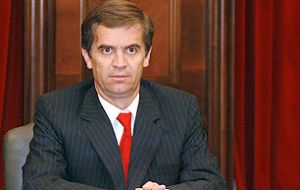MercoPress. South Atlantic News Agency
Chile leaves basic rate unchanged at 5% for the fourth month running
 Short-term inflation risks have increased, said Central bank chief Rodrigo Vergara
Short-term inflation risks have increased, said Central bank chief Rodrigo Vergara Chile’s central bank kept its key interest rate unchanged at 5% for a fourth consecutive month as surging domestic demand and deterioration in the global economy leave little scope to change monetary policy.
Policy makers will increase borrowing costs within five months after keeping them unchanged at least through June, according to the median estimate of 59 economists surveyed by the central bank on May 9.
They had forecast a rate cut this year as recently as February on expectations growth would slow. But the central bank raised inflation and economic growth forecasts for 2012 in its latest monetary policy report, saying inflation will stay about the upper limit of the 2% to 4% target range for the first half of the year.
Inflation surpassed that limit in the three months through February before falling to 3.8% in March and 3.5% in April. The decline may be temporary as consumer price pressures persist, Central bank president Rodrigo Vergara told an economic forum in Santiago on May 3.
“Short-term inflation risks have increased,” he said. “However, risks from the external scenario remain important and their fruition can cause significant effects in the Chilean economy.”
Some traders in Chile this week started betting on an interest rate cut again as the price of copper fell following news that talks to form a government in Greece collapsed. The metal, which accounts for more than half of the country’s exports, is down 9.2% in May and is heading for the biggest monthly drop since September.
Chile’s one-year interest rate swap, which reflects traders’ views of average borrowing costs, closed below 5 percent on May 15 for the first time since early March and fell another 15 basis points to 4.84 percent two days later.
The central bank will publish data Friday for first quarter gross domestic product, which according to the bank’s Imacec index that serves as a proxy for GDP grew 5.6% from the year before. That would be the fastest expansion since the second quarter of 2011.
“Domestically, economic activity grew faster in the first quarter than had been projected in the last Monetary Policy Report, although without deviating substantially from its trend growth rate,” the central bank said in a statement accompanying the decision. “The labour market remains tight.”




Top Comments
Disclaimer & comment rulesCommenting for this story is now closed.
If you have a Facebook account, become a fan and comment on our Facebook Page!